Achievements and Announcements
ACHIEVEMENTS
- $3m grant to tackle the burden of chronic pain in Australia
- FII scientist focused on regenerating human tissue with biomaterials
- Pharmacy and physiotherapy researchers named Young Tall Poppies of Science for 2024
- Maurice de Rohan Scholarship winners take their research to the world
- Journalism students impress judges at 2024 SA Media Awards
- UniSA represented in the 40 Under 40
- Other recent award winners
ANNOUNCEMENTS
ACHIEVEMENTS
$3m grant to tackle the burden of chronic pain in Australia
UniSA has won a $3 million Medical Research Future Fund (MRFF) Primary Health Care Research Initiative grant to address the quality of care and information provided to Australians who experience chronic pain.
Only 1 in 100 Australians living with chronic pain are able to access multidisciplinary pain management, and when they do, fewer than 20% of them receive best-practice care.
The UniSA project, EQUIPP (EQUIpping the general Public to prevent and overcome chronic Pain), is one of four MRFF projects from this round that will address chronic pain, out of a total of nine projects awarded – with UniSA the only South Australian university recipient.
Chief Investigator Professor Lorimer Moseley AO says the EQUIPP project is the next step in the team’s 20-year research journey into the misconceptions that promote and sustain chronic pain, and how to work with consumers and the community to shift these.
The project will implement a combined intervention in two rural communities, the Limestone Coast in South Australia, and Western Victoria.
“In terms of disability and economic impact, chronic pain is our biggest health care challenge,” Prof Moseley says.
“Our research has identified two modifiable barriers to reducing the immense chronic pain burden. First, the majority of health professionals do not have the necessary skills, confidence, resources and support to deliver the best treatments for chronic pain. Second, the broad public does not demand or expect the best treatments for chronic pain.
“So, we need to change consumer expectations and community norms, and equip healthcare professionals to deliver those treatments within the significant resource limitations facing rural Australia.”
The EQUIPP intervention will use educational content the team has developed over years of research with consumer and community groups to co-design educational strategies and deliver a ‘whole of community’ educational lifestyle program for people living with chronic pain.
It will draw on the collective expertise of the entire investigator team across the fields of pain, rural health, implementation science, quality use of medicines, health promotion and public messaging, health economics and biostatistics.
Project Manager Dr Louise Wiles says that pain education, delivered by multidisciplinary health practitioners in primary care, is recommended internationally as an integral component of best care for chronic pain. Despite this, care currently delivered to people with chronic pain is often characterised by inadequate provision of advice and education, inappropriate referral for imaging, and high rates of opioid prescription.
Read more details in the media release.
FII scientist focused on regenerating human tissue with biomaterials
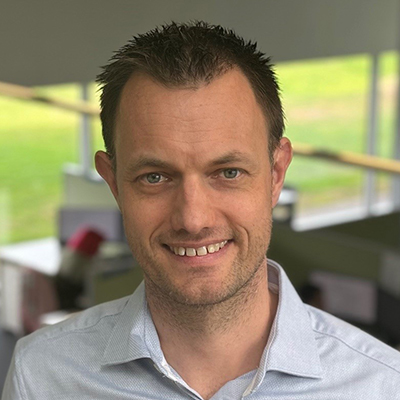
UniSA scientist Professor Ferry Melchels has been awarded a $1.2 million Australian Research Council (ARC) Future Fellowship to develop 3D bioprinted scaffolds to regenerate human tissue.
The chemical engineer, who joined UniSA’s Future Industries Institute in September 2023 from Heriot-Watt University in Edinburgh, says the long-term goal is to help the body regenerate itself and be less dependent on donor tissues.
“By making 3D printed structures using biomaterials that slowly expand, the blood vessels will have time to grow into it, creating healthy, well vascularised tissue,” Prof Melchels says.
Prof Melchels has recently collaborated with Edinburgh University scientists to create artificial blood vessels for the heart, which down the track could transform the treatment of cardiovascular diseases.
Earlier work he undertook at the Queensland University of Technology has led to spinout biomedical company BellaSeno, which makes 3D printed breast scaffolds to regenerate breast tissue as an improved alternative to silicone implants, such as after a mastectomy.
“3D medicine has an exciting future and as we progress research in this area we can expect to see more advances in wound healing, surgery and cancer research,” he says.
Pharmacy and physiotherapy researchers named Young Tall Poppies of Science for 2024
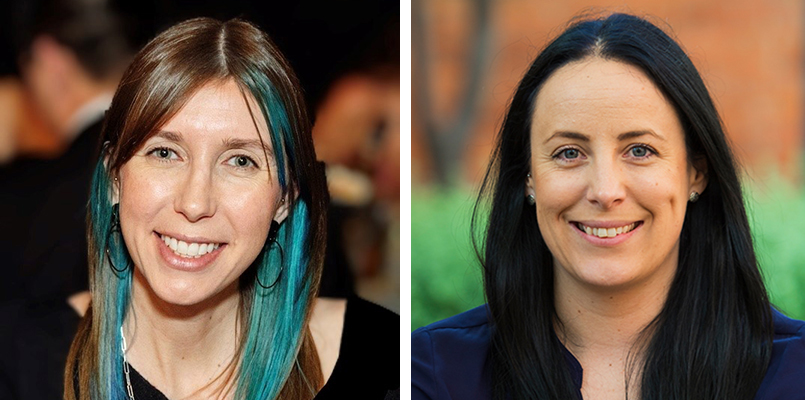 (L-R) Dr Jacinta Johnson and Dr Felicity Braithwaite.
(L-R) Dr Jacinta Johnson and Dr Felicity Braithwaite.UniSA health scientists Dr Jacinta Johnson and Dr Felicity Braithwaite are among eight SA researchers named 2024 Young Tall Poppies of Science.
The awards recognise groundbreaking scientific research that benefits society.
Dr Johnson is a senior lecturer in pharmacy at UniSA and also responsible for driving all pharmacy research across SA Health. She leads projects investigating new systems to make medicines safer for the general public and curb the high rate of medication-related harm in Australia.
SA Health is working with Dr Johnson to trial a new model where pharmacists collaborate with doctors to electronically prescribe medicines, proactively preventing errors.
Dr Braithwaite is a qualified physiotherapist whose research is focused on debunking common misconceptions around osteoarthritis, promoting better treatments.
In partnership with patients, Dr Braithwaite has developed some novel educational videos about managing osteoarthritis, as well as exploring the power of placebo treatments through fake acupuncture needles to drastically reduce knee pain.
The researchers accepted their awards at a special ceremony at the SA Museum on 9 August.
Maurice de Rohan Scholarship winners take their research to the world
Three PhD students have been awarded international scholarships enabling them to pursue their research globally.
Hannah Cockram, David Randall and Raman Voranau are recipients of the Maurice de Rohan Scholarship and will travel to the UK or USA to further their PhD research.
The scholarship, named after Maurice John de Rohan AO OBE, an Australian engineer and former Agent General for South Australia, is awarded to research degree students to provide them with the opportunity to gain an international perspective on their research topics.
The students will receive funds to travel to the UK or US to improve their thesis through research or data collection and build research relationships with academics at international institutions.
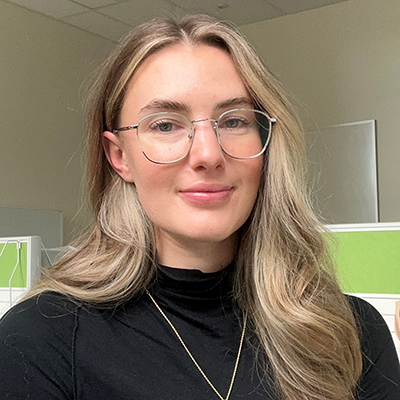
Hannah Cockram will spend three months at King’s College London, working with Professor Nicola Fear, a leading expert in the field of veteran and first responder health and wellbeing.
Cockram’s PhD focuses on the psychological and physical wellbeing of veterans, first responders, and their families as they transition through the Wellbeing for Australian Veterans and Emergency Services (WAVES) program.
“This experience will significantly enhance my learning, professional development and future career,” she says.
“It also allows me to significantly contribute and make a meaningful impact on the lives of those who have dedicated themselves to serving others.”
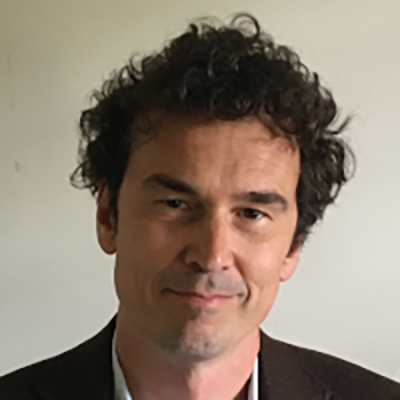
David Randall, whose PhD is investigating how ePortfolios can help university students build lifelong learning skills, will travel to the UK.
“The de Rohan family have made it possible for me to visit the University of Manchester not only to collect data and gain an international perspective on how ePortfolios are being leveraged in higher education learning and teaching, but also have the time to build relationships and spruik the great research work we do here at UniSA and in C3L (Centre for Change and Complexity in Learning).”
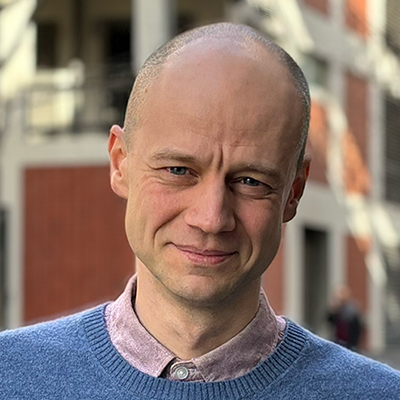
Raman Voranau will head to the UK to advance his PhD research into inclusion and career insecurity in the video game production industry.
“The support provided will enable me to visit a university in the UK where I will study factors that enable greater inclusion of underrepresented groups in the industry and what allows them to develop more sustainable careers,” he says.
Journalism students impress judges at 2024 SA Media Awards
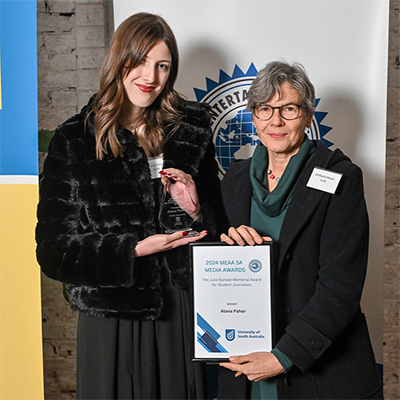
UniSA journalism and creative writing student Alana Pahor is showing the beginnings of a promising future in the media industry after winning the 2024 Julie Duncan Memorial Award for Student Journalism.
Pahor, who is in her third year of the Bachelor of Journalism and Professional Writing and Bachelor of Arts (Creative Writing and Literature), was presented the accolade at the SA Media Awards, which recognises journalists from various outlets across the state for their important and courageous stories, features or reports.
Pahor is editor of the UniSA student publication On The Record, having previously been its arts editor. She also has a passion for reporting on issues affecting young people.
“I really enjoy arts and literature. I've been going to musicals with my mum since I was a kid and reading is my favourite hobby. I like to write about topics surrounding arts as I think they often aren't given enough credit – they make people happy, they inspire people, they give people something to connect through,” Pahor says.
“So, I suppose my interest in writing about arts is to do with promoting those happy, inspiring aspects and showing how important arts is for community.
“In terms of why I like to write about issues that impact young people, it's for a pretty simple reason: I'm a young person, many of my peers are young people, and I want to cover the issues that are impacting us.”
With her sights set on a writing career in the arts, Pahor is enjoying building her confidence through her role at On The Record.
“When I was first starting out in my degree it gave me a platform to publish my work in and it helped me get used to the editing process and the idea of people viewing my work in a supportive environment,” she says.
“My work as the editor this year has also helped me build my sub-editing skills, which I think is an important skill to have in any writing job. I've really enjoyed working alongside my editorial team members too – they're great, creative people and we're hoping to get media accreditation to go to the Royal Adelaide Show soon and report on it, which is exciting.”
Fellow UniSA student Chelsea McLean was highly commended by the judges for her excellent reporting on the effects of the rental crisis on young people. Rachel Forbes, president of the UniSA student-run radio station, was commended.
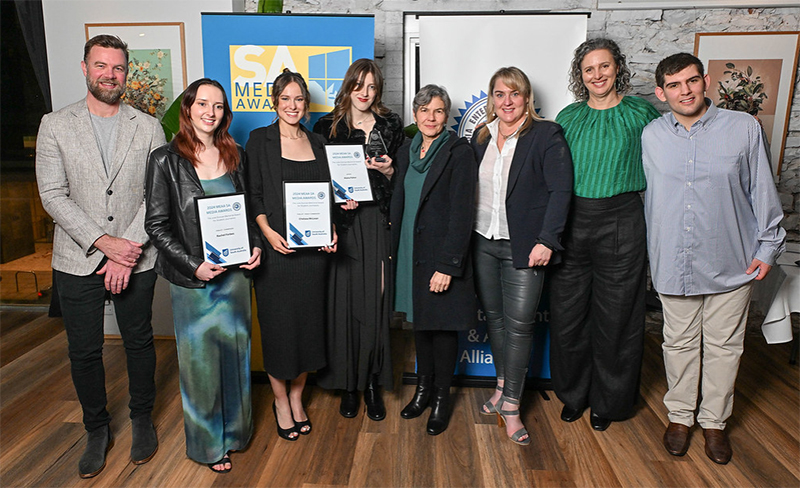
Other UniSA-connected award winners included four alumni:
- Radio/Audio – News Reporting: Angus Randall, ABC, ‘National eyes on SA as it passes Voice legislation’.
- Multimedia News or Feature: Nicholas Maher, ABC, ‘International crises: explained’.
- Investigative Journalism: Riley Walter, The Advertiser, ‘Child protection failures’.
- The Max Fatchen Award for Best Young Journalist: Isabel McMillan, The Advertiser, body of work.
UniSA represented in the 40 Under 40
UniSA staff and alumni have been recognised in Solstice Media’s 2024 40 Under 40 list.
Alum Bonnie McBride was presented with the Creative Thinking Award, alum Zachary Munn received the Discovery Award and staff alum and STEM Research Fellow Giles Kirby received the Entrepreneurial Award. Research Fellow at the Centre for Cancer Biology Dr Sarah Boyle and Associate Professor in Healthy Ageing Ashleigh Smith were both named on the list.
UniSA alumni in the 40 Under 40 include:
- Zachary Bailey
- Ross Gray
- Jack Kempson
- Stephanie McConachy
- Madelene Ragno
Other recent award winners
Other recent award recipients from UniSA include:
- Asia-Pacific Network for Science and Technology Centre (ASPAC) Fellowship 2024 – Dr Kristin Alford, Director of MOD. Dr Alford will travel to South Korea to attend the ASPAC conference at the Gwacheon National Science Museum to present about futures thinking in science centres and promote MOD. as a future-focused museum.
- Australian Institute of Sport (AIS) Athlete Education Scholarship awarded to UniSA Masters in Teaching student Lucy Austin, who plays netball for the Adelaide Thunderbirds. The scholarship supports high performance athletes by providing financial support towards their education.
ANNOUNCEMENTS
Sports Vouchers kick goals for kids facing barriers

Children reap enormous rewards from participating in organised sport or physical activities. These include physical and social benefits, and assistance building emotional control, resilience and self-esteem – while providing a healthy outlet from life’s daily pressures.
Australian states have various versions of incentive programs that focus on getting more children participating in organised physical activities.
In South Australia, the State Government’s Sports Vouchers program has disbursed more than $48 million since it launched in 2015, helping ease the cost of sports participation for families. However, data reveals that children from areas facing socioeconomic challenges are less likely to use Sports Vouchers, when compared to children from advantaged areas.
Now, a team led by UniSA is delving into the reasons behind the low take-up rate by families who could benefit the most and developing a strategy to overcome the barriers.
Funded by a National Health and Medical Research Council (NHMRC) 2023 Partnerships Projects grant, The Office for Recreation, Sport and Racing, Preventive Health SA and a Channel 7 Children’s Research Foundation Enabling Grant, the project is led by UniSA researchers Professor Carol Maher and PhD student Catherine Simpson.
Team lead, Prof Maher, says sports and physical activities are key to children’s health and wellbeing.
“Sports and other active pursuits like dance are excellent for children – keeping them fit and healthy, and teaching them the value of practice and discipline. Physical activity is a great outlet from a mental health perspective, plus it’s fun and social,” Prof Maher says.
“The SA Government’s $100 Sports Voucher scheme aims to help children participate in sports, dance, learn to swim, scouts or guides.
“However, looking at the claims data, we know that children from families experiencing economic hardship, who could benefit the most, are the least likely to access it.
“In this project we’ll work with a range of stakeholders, community leaders and service providers to roll out a community-wide strategy to increase Sports Voucher uptake and sports participation.
“We are starting with a trial across the whole of the City of Salisbury. In the future, it could potentially be scaled up in other communities across SA and nationally.”
There are multiple reasons for the low use of Sports Vouchers, so the team will work with many partners to develop a multi-faceted solution.
While additional costs involved with playing a sport are cited by families as the number one barrier, there are other hurdles. These include transportation requirements, the impacts of challenging personal circumstances, and low awareness of the Sports Voucher program.
Prof Maher says awareness of the Sports Voucher program is particularly low among parents from non-English speaking backgrounds.
“This is highly relevant to culturally diverse areas like Salisbury, where over 40% of families with children are English-as-a-second-language households,” Prof Maher says. “So, one of our goals will be to raise awareness of the program, working with schools and partnering on community events.”
The team will also work with sport providers to encourage more to accept the voucher.
Other Stories
- Transformative new Adelaide University launches to the world
- World-first refrigeration system cuts energy costs by 20%
- Prevention of child abuse and neglect shown to save billions in adult welfare costs
- Research suggests go nuts for weight loss
- From the Vice Chancellor: There’s a new band in town
- Achievements and Announcements
- We’d move if we could: Over half of Aussies eye smaller towns for better housing and family life
- UniSA launches four new space projects worth over $18 million
- In Pictures: UniSA Open Day
- The latest books from UniSA researchers




